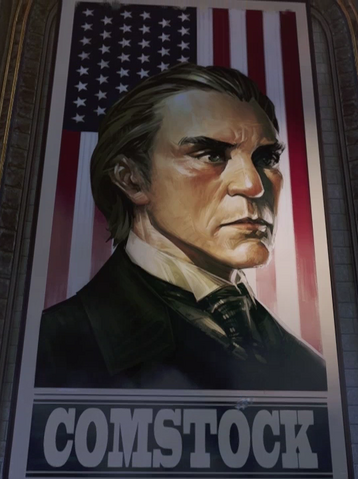What I feel is the biggest problem with Bioshock Infinite (plot-wise anyway; I don't have much interest in discussing gameplay errors or the scaling back that seemed to have occured) is in relation to the Voxophones. In Rapture, each Audio Diary tied characters' plotlines together, they were utilised in giving background to the city pre-war, during the war and after the war. Each Audio Diary was a plotline for that specific character but it all fed together in the development of the city and to assist the main plot. In Bioshock Infinite though, this doesn't really seem to be the case. Preston E Downs for example has his own storyline but it never really ties into the main plotline, the best it does is in showing how Daisy Fitzroy utilises children and how people may change their outlook. Constance Field (Feld?) is another example, she has a relevance in her name, and also in showing what some people may think of Elizabeth in Monument Island (and to some extent how young girls are brought up) but the plot just ended abruptly with no indication of what happened/will happen.
Diane McClintock's tale is one I'd put similar to these, it's a self contained story but it shows how people were brought into Atlas' influence. It also helps show the sudden outbreak of the riots, an introduction to Steinman, slight development of Ryan, development of Atlas and development of post-riot Rapture (highlighting the nature of the raids). There are other people with sole Audio Diaries (mostly done to give different perspectives of events) but those that reoccur, in general, have their own story that feeds into the main plot. And, even moreso, the characters we only met in Voxophones, we saw their fate; their plotlines had reached a conclusion. Suchong murdered by the Big Daddy, Diane dead on the broken table, Ryan's mistress killed, Bill McDonagh murdered. It's hard to display them all, and all the Voxophone's connections because most of them all interweave quite well (even the woman whose daughter became a Little Sister for example ties in with Suchong, Ryan and Atlas while having her own plotline concluding in her and her husband's suicide; Infinite's equivalent in Hadie Girth ties in with Monument Island [it helps suggest why Fink seemed to be popular though] and gives the Handyman a story but we never figure out what happens to her, her story doesn't conclude and).
While Bioshock Infinite has a significant number of Voxophones that are related to the main plot, most of the side ones have already branched out far earlier (for example, Daisy Fitzroy's branches out from the murder and charts how her views refine and while it develops her character and places an emphasis on Columbia's racist views it never really feeds back into the main plot; in order for it to do so we'd need another perspective that shows somebody joining up with the Vox or the hierarchy of the Vox), are usually confined to the faction or are inconsequential, only developing a singular character, a singular story and never concluding.
I don't know if I've explained what I'm trying to say well, but as the video said, Rapture was like it's own pocket universe, each part of the fiction combined to create an area that, within it's own internal logic, made sense. Infinite has some very well thought out stories that feed into the main plot and develop a few people simultaneously (particularly those that are tear-related and time-travel/multiverse-related such as the Lutece's, Comstock's and Lady Comstock's) but others just seem inconsequential and we don't end up with a world that seems to gel with each specific piece as we did in Rapture (yes, Rapture had a problem in revealing its hand too early and then almost ignoring the 'a man chooses a slave obeys' by making us follow Tenenbaum's orders; but the entire setting, the characters, the factions, they all were elaborated upon, we got an insight into everything). Perhaps I'm rambling by now, I apologise. Bioshock Infinite is a game I very much enjoyed and it did many things well (it's multiverse story is surprisingly tight compared to most others I've seen) but overall I think I still prefer the original (gameplay included in my choice; I went back to Bioshock and I still like the gameplay as I always have [I know many people don't however] and while I can see clearly that Bioshock Infinite has more refined combat, I don't think it's big enough to compensate for all of the other areas that, I feel, Bioshock is superior to Infinite).


